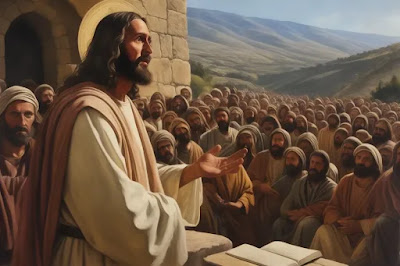- Luke 4:16 KJV
And what was their reason for desiring to have him among them? Were they thirsting for spiritual blessings, the forgiveness of sins, the renewal of the heart? No! the Nazarenes were only anxious to partake of temporal benefits; they wished Jesus to heal their sick, as he had healed the sick of other cities. When, at length, He came to Nazareth, he was invited to read. It was usual for seven people in succession to read a portion of the Scriptures; one of them was a priest, another a Levite, but the other five might belong to any tribe. There was a minister of the synagogue, but his office was not like the office of ministers in our churches. It was his part to appoint which of the readers he pleased to read the lessons for the day. One of the lessons was taken from the law, and one from the prophets. The various books of the Scriptures were written on rolls of parchment. The roll containing the prophecy of Isaiah was presented to Jesus. The words he read were probably the lesson for the day, and they applied most forcibly to himself. Did the Nazarenes understand the meaning of the sublime passage which the Savior read on that day? Perhaps some thought that Isaiah spoke of himself when he said, "The Spirit of the Lord is upon me, because he has anointed me to preach the gospel to the poor." But it was Jesus who really came to preach glad tidings, or "the gospel," to the poor in spirit. In that passage poor lost man is compared to a miserable prisoner, whose eyes had been put out, and who had been thrust into a dark dungeon. One of our Christian poets describes our condition by nature in the following stanza—
"Plunged in a gulf of deep despair,
We wretched sinners lay,
Without one beam of cheerful hope,
Or spark of glimmering day."
Jesus came to deliver the poor blind captive, bruised, or galled by the chains of sin. He came to preach the "acceptable year of the Lord." There was a year of deliverance among the Jews—it occurred every fiftieth year, and was called the year of Jubilee. That year was a figure of Christ's great salvation from death and hell. Let each of us ask himself, "What do I know of this deliverance? Am I still tied and bound with the chain of my sins; or have I been set free from the power of Satan?"
The readers in the synagogue were permitted to explain the lesson they had read. Our Lord availed himself of this permission, and said, "This day is this scripture fulfilled in your ears." For a moment the people were astonished at his words; but the next their pride rose. They remembered that he was considered to be the son of a carpenter, and they made this an excuse for despising him. It is pride which causes numbers to reject God's salvation; they think to themselves, "Who is that man that I should listen to him? Why should he know more than I do?" Thus the Nazarenes reasoned. Jesus knew well that rage was working in their hearts—he knew that they were angry with him for having healed the sick of other cities before he had healed theirs; and he answered their thoughts by showing them that God had always chosen whom he would. Elijah in time of famine had sustained with oil and meal a widow of a heathen city; and Elisha had cured a leper of a heathen country, and not of his own. Jesus would not encourage those earthly-minded people to expect any benefits from him—while they rejected the greatest, he would not give them the least.
We see how hateful a worldly mind is to Jesus. If we are more anxious to possess an earthly portion than a heavenly inheritance, we are not His people. Yet you know well that the desire of the heart by nature is only for health, riches, pleasures, for worldly honor, or domestic comforts. If Christ would bestow these on all who asked, what constant fervent prayers would be offered at his throne! The heathen imagine that their idols will bestow earthly blessings upon them, and that is one reason they pray to them so earnestly.
Behold with wonder the madness of the Nazarenes! They cast out the Savior of the world, and forfeit their part in all his blessings! His Father preserved his life, for his hour was not yet come, and it has been well observed, "His children are all immortal until their work is done."
Can we behold without dismay such treatment of the Lord of heaven and earth? If He who was so lovely and so gracious was thus treated, ought not we to be prepared for similar usage? Had he been less faithful, the gentle Savior might have avoided persecution; but he sought not to please men, but God; he desired not to get honor, but to save souls. We may often escape persecution by acting insincerely and unfaithfully. But what, if we should also lose our peace of mind, and the approbation of God!
Are you Saved?




